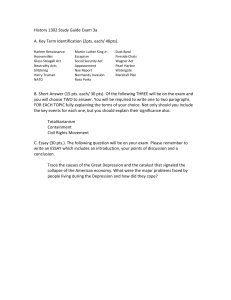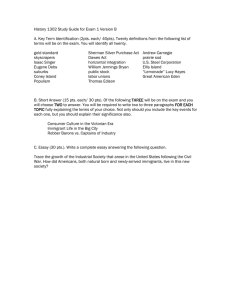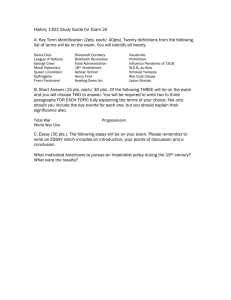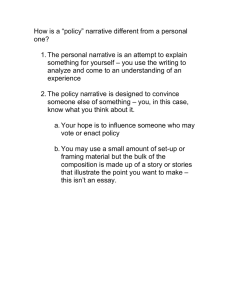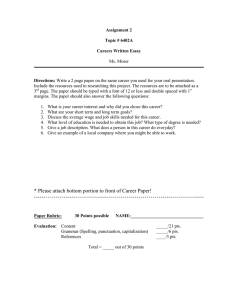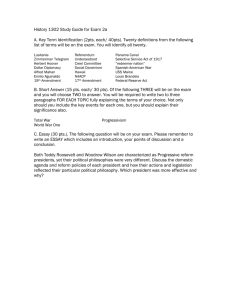Beginnings Hamilton/Reis Narrative Essay—Your Personal Story
advertisement
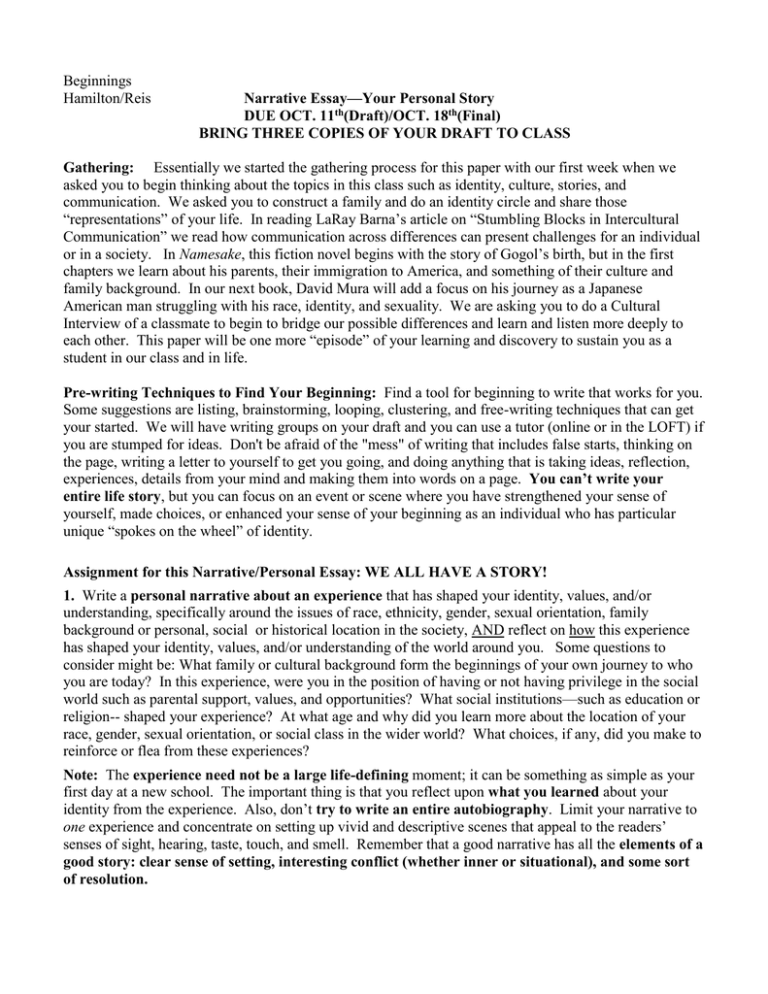
Beginnings Hamilton/Reis Narrative Essay—Your Personal Story DUE OCT. 11th(Draft)/OCT. 18th(Final) BRING THREE COPIES OF YOUR DRAFT TO CLASS Gathering: Essentially we started the gathering process for this paper with our first week when we asked you to begin thinking about the topics in this class such as identity, culture, stories, and communication. We asked you to construct a family and do an identity circle and share those “representations” of your life. In reading LaRay Barna’s article on “Stumbling Blocks in Intercultural Communication” we read how communication across differences can present challenges for an individual or in a society. In Namesake, this fiction novel begins with the story of Gogol’s birth, but in the first chapters we learn about his parents, their immigration to America, and something of their culture and family background. In our next book, David Mura will add a focus on his journey as a Japanese American man struggling with his race, identity, and sexuality. We are asking you to do a Cultural Interview of a classmate to begin to bridge our possible differences and learn and listen more deeply to each other. This paper will be one more “episode” of your learning and discovery to sustain you as a student in our class and in life. Pre-writing Techniques to Find Your Beginning: Find a tool for beginning to write that works for you. Some suggestions are listing, brainstorming, looping, clustering, and free-writing techniques that can get your started. We will have writing groups on your draft and you can use a tutor (online or in the LOFT) if you are stumped for ideas. Don't be afraid of the "mess" of writing that includes false starts, thinking on the page, writing a letter to yourself to get you going, and doing anything that is taking ideas, reflection, experiences, details from your mind and making them into words on a page. You can’t write your entire life story, but you can focus on an event or scene where you have strengthened your sense of yourself, made choices, or enhanced your sense of your beginning as an individual who has particular unique “spokes on the wheel” of identity. Assignment for this Narrative/Personal Essay: WE ALL HAVE A STORY! 1. Write a personal narrative about an experience that has shaped your identity, values, and/or understanding, specifically around the issues of race, ethnicity, gender, sexual orientation, family background or personal, social or historical location in the society, AND reflect on how this experience has shaped your identity, values, and/or understanding of the world around you. Some questions to consider might be: What family or cultural background form the beginnings of your own journey to who you are today? In this experience, were you in the position of having or not having privilege in the social world such as parental support, values, and opportunities? What social institutions—such as education or religion-- shaped your experience? At what age and why did you learn more about the location of your race, gender, sexual orientation, or social class in the wider world? What choices, if any, did you make to reinforce or flea from these experiences? Note: The experience need not be a large life-defining moment; it can be something as simple as your first day at a new school. The important thing is that you reflect upon what you learned about your identity from the experience. Also, don’t try to write an entire autobiography. Limit your narrative to one experience and concentrate on setting up vivid and descriptive scenes that appeal to the readers’ senses of sight, hearing, taste, touch, and smell. Remember that a good narrative has all the elements of a good story: clear sense of setting, interesting conflict (whether inner or situational), and some sort of resolution. Audience: You should write thinking of our coordinated studies community as your audience. Don't write about something that is too private to share with anyone in this class. The papers should be able to be read publicly. Style: You should write about your own life and experiences. This paper should be created out of your explorations of the topics in the class. You are NOT being asked to write fiction—or a novel—this is about your life as story. Your own writing style could be informal, use dialogue, use description, use comparison, or use examples, but should primarily show rather than tell. Process: In writing autobiographically, it is important to remember that writing is a process and you can start one place and expect to revise and change the beginning, middle or end at any point in the process. We expect you to bring a typed draft (4 copies) for feedback from classmates on October 11th. You should continue to revise and edit the paper, incorporate the feedback that seems best, and turn in the revised, edited paper on time on October 18th. Resources on Carol’s blog: Student Paper (“Leaky Canteen”) and “Composing a Life” (Bateson) Format: Typed/word processed in plain type style, printed 12 point, double spaced with 1" margin on all four sides of 81/2"x 11" paper. The final paper should have your name, course, and date in the upper left corner, a centered title, indented paragraphs, double spacing, and be without folders or report covers. ESSAY RUBRIC IDEAS AND CONTENT: 40 pts. ________ The ideas (both in the narrative and reflection aspect) should be clear, focused, fully developed, and interesting. Ideas should be supported with relevant details rather than generalities. Insightful connections between ideas should be evident. ORGANIZATION: 20 pts. _________ The paper should demonstrate a good sense of pacing. Introduction, conflict, climax, and resolution should be well developed. Controlling idea should be easily identified, and tangents should be avoided. The overall structure should flow smoothly with logical sequencing. Transitions should also be smooth. STYLE: 20 pts. __________ Imagery should be descriptive and strong and should appeal to the senses. Remember: show, don’t tell. The writing should be clear and fluid. Verbs should be strong and active, vocabulary should be sophisticated without being “wordy,” and sentence structure and length should be varied. VOICE: 10 pts. __________ The voice should be engaging and natural. The reader should be able to feel a sense of interaction with the writer. Dialog (if used) should sound natural. CONVENTIONS: 10 pts. ___________ Grammar and spelling should be standard and correct. TOTAL ESSAY POINTS: 100 pts. ___________ Grade Scale: 90-100=3.5-4.0 or A; 80-89=3.4-2.5 or B; 70-79= 2.4-1.5 or C. Note: This must be a new paper, not something previously submitted in another class.
